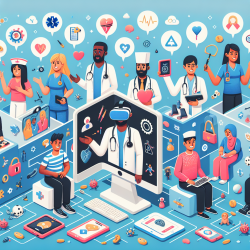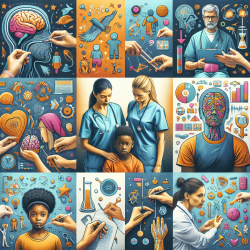Introduction
In the ever-evolving landscape of healthcare, genomic medicine stands as a beacon of personalized care, offering unprecedented opportunities for tailored interventions. A recent study titled "Personal Genomes in Practice: Exploring Citizen and Healthcare Professionals’ Perspectives on Personalized Genomic Medicine and Personal Health Data Spaces Using a Mixed-Methods Design" sheds light on the potential of genomic medicine to revolutionize healthcare practices, including speech-language pathology. By leveraging genomic insights, practitioners can enhance their decision-making processes, ultimately leading to better outcomes for children.
The Promise of Genomic Medicine
Genomic medicine, a cornerstone of personalized healthcare, utilizes genomic analysis to identify patient subgroups and tailor interventions accordingly. This approach is particularly relevant in speech-language pathology, where understanding the genetic underpinnings of communication disorders can inform more effective treatment plans. The study highlights the importance of genomic information in risk assessment, prevention, and therapeutic targeting, all of which are crucial for speech-language pathologists aiming to optimize care for their young patients.
Key Insights from the Study
The research employed a mixed-methods design, incorporating surveys, interviews, and focus groups to gather perspectives from healthcare users and professionals. Several meta-themes emerged:
- Interest in Genomic Information: Participants expressed a strong desire to access genomic data, recognizing its potential to inform personalized care strategies.
- Data Control and Sharing: The study underscored the value of robust data infrastructure and the need for transparent data-sharing practices, particularly with non-commercial stakeholders.
- Autonomy and Trust: Autonomy was a central concern, with participants emphasizing the importance of patient control over their genomic data. Institutional and interpersonal trust were also deemed critical for the successful implementation of genomic medicine.
- Implementation of Personal Health Data Spaces (PHDS): Participants advocated for PHDS solutions, which can enhance patient control over their data and promote the use of genomic insights in clinical practice.
Implications for Speech-Language Pathologists
For speech-language pathologists, the integration of genomic medicine into practice offers a data-driven approach to understanding and addressing communication disorders. By utilizing genomic data, practitioners can:
- Identify genetic markers associated with speech and language disorders, enabling early intervention and tailored therapy plans.
- Enhance patient engagement by involving families in the decision-making process, supported by clear, accessible genomic data.
- Foster a collaborative care model, where genomic insights are shared among healthcare providers to ensure comprehensive, coordinated care for children.
Encouraging Further Research
While the study provides valuable insights, it also highlights the need for ongoing research into the practical applications of genomic medicine in speech-language pathology. Practitioners are encouraged to explore the latest developments in genomic research and consider how these advancements can be integrated into their practice to improve outcomes for children.
Conclusion
Genomic medicine holds the potential to transform speech-language pathology by providing personalized, data-driven insights into communication disorders. By embracing this innovative approach, practitioners can enhance their clinical decision-making and deliver more effective, individualized care to their young patients.
To read the original research paper, please follow this link: Personal Genomes in Practice: Exploring Citizen and Healthcare Professionals’ Perspectives on Personalized Genomic Medicine and Personal Health Data Spaces Using a Mixed-Methods Design.










